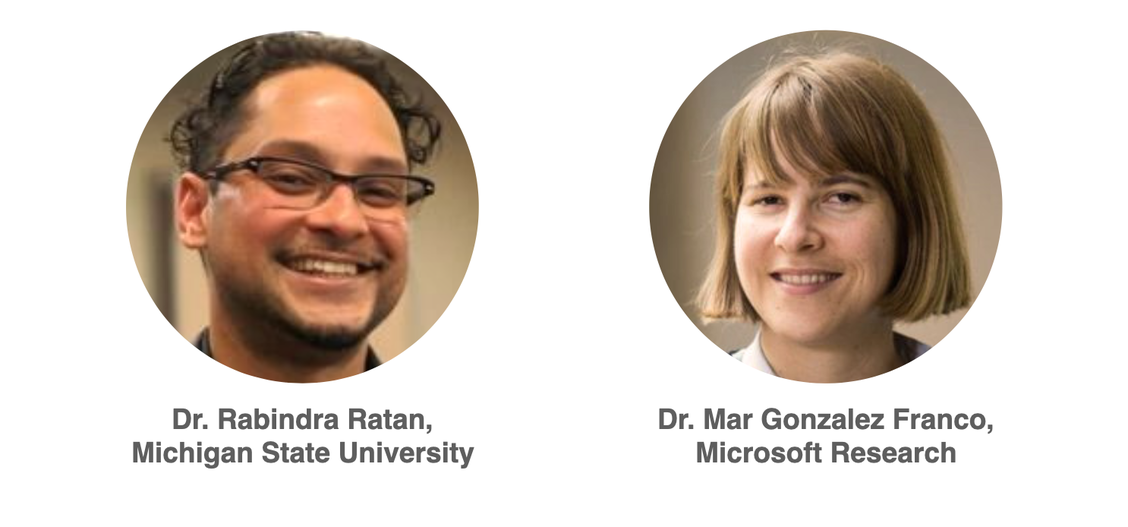
Day(s)
:
Hour(s)
:
Minute(s)
:
Second(s)
A Workshop at ACM CHI 2022
AI-Generated Characters: Putting Deepfakes to Good Use
Hybrid Workshop on April 30, 2022 | 9:30 am (CDT)
New Orleans Ernest N. Morial Convention Center room 295-296
AI-generated characters (more infamously known as ”deepfakes”) are a form of digital media generated by deep neural networks, which feature the human appearance and appear authentic to human beings. Such realistic renderings are made possible through advances in generative machine learning for the hyper-realistic synthesis, recreation, and modification of prose, images, audio, and video data.
While the technology is perhaps most widely associated with media manipulation and misinformation, it is increasingly used for positive applications as well. For instance, it is integrated into industries ranging from entertainment, such as movie studios and games, to humanitarian efforts and educational tools. Given the growing interest in AI-generated characters across industries, we see a potential for future positive applications in a variety of areas including learning, privacy, communication, art, and therapy. This workshop will bring together researchers in HCI, AI, and related fields to explore positive applications and design considerations for AI-generated characters and related forms of synthetic media.
Organizers
- Valdemar Danry, MIT Media Lab
- Joanne Leong, MIT Media Lab
- Pat Pataranutaporn, MIT Media Lab
- Pulkit Tandon, Stanford University
- Yimeng Liu, University of California, Santa Barbara
- Roy Shilkrot, MIT Media Lab
- Parinya Punpongsanon, Osaka University
- Tsachy Weissman, Stanford University
- Pattie Maes, MIT Media Lab
- Misha Sra, University of California, Santa Barbara
Call for Participation
We invite researchers from both academia and industry to submit a short position paper on the theme of AI generated characters and HCI. We will evaluate submissions on fit, ability to stimulate discussion, and contribution to the future of HCI. The workshop’s website includes examples of past work in the area to help inspire and inform position papers. Papers should be a maximum of 4 pages, and should be submitted in the CHI Extended Abstracts format. The submission deadline is March 5th, 2022.
Second Deadline for Submission : March 31, 2022
At least one author of each accepted position paper must attend the workshop and all participants must register for at least one day of the conference. We will host accepted papers on the workshop’s website for participants and others to review prior to the meeting. Submission can be accessed through the website: http://deepfakes.media.mit.edu/.
Suggested topics / areas:
- AI-generated media & AI-generated characters
- Case studies of the use of characters in HCI
- Virtual human creation & synthesis pipeline
- Learning with virtual instructors
- Health and wellbeing applications
- Generative Media Synthesis
- Human-AI collaboration
- Authenticity, Style and Improvisation
- AI Embodiment: Can the Mirror Lie?
- Design pitfalls and guidelines
- Ethics of AI-generated characters and their use in HCI
Keynote Speakers

Dr. Rabindra (Robby) Ratan is an Associate Professor and AT&T Scholar at Michigan State University’s Department of Media and Information as well as Director of the Social and Psychological Approaches to Research on Technology-Interaction Effects (SPARTIE Lab). Dr. Ratan conducts research on the effects of human-technology interaction, focusing on how media technologies (e.g., avatars, agents) influence meaningful outcomes (e.g., equity, inclusion, motivation) across societal contexts (e.g., education, health, business). He is particularly interested in the Proteus effect (i.e., avatar characteristics influencing user behaviors), artificial social agents, virtual meetings, the metaverse, and toxicity in online gaming.
Dr. Mar Gonzalez-Franco is a Researcher in the EPIC (Extended Perception Interaction and Cognition) team at Microsoft Research. In her research Mar tries to achieve strong immersive experiences using different disciplines: Virtual Reality, Avatars, computer graphics, computer vision and haptics. All while studying human behavior, perception and neuroscience. Her work has been widely published and received multiple awards including best demos and papers and the 2022 IEEE VGTC Virtual Reality New Significant Researcher Award. Most recently she has been behind the open sourcing and releasing of libraries such as the Microsoft Rocketbox. And has worked on products like Microsoft Mesh Avatars. Learn more at: margonzalezfranco.GitHub.io @twi_mar
Program
| Time (CDT) | Program |
| 9:30 am | Welcome & Opening remarks |
| 10 am | Opening Keynote: “Go fake yourself: Deepfake Avatars for Well-being & Equity” – Dr. Rabindra Ratan, Associate Professor and AT&T Scholar at Michigan State University’s Department of Media and Information |
| 10:45 am | Short Break |
| 11:00 am |
Introduction to AI-generated Characters research by MIT Media Lab Fluid Research group Pat Pataranutaporn, Joanne Leong, Valdemar Danry |
| 11:30 am |
Research Presentation – Session 2: Technical Advancements
|
| 12:30 pm | Lunch Break |
| 1:30 pm |
Research Presentation – Session 3: Positive Applications for AI-generated Characters – Session 4: Ethics & Social Impact
|
| 2:30 pm | Breakout session |
| 3:30 pm |
Closing Keynote:”Avatars more important than ever” by Dr. Mar Gonzalez Franco, Microsoft Research |
| 4:30 pm |
Share back & Discussion
|
| 5:00 pm | Next Steps & Closing Remarks |

